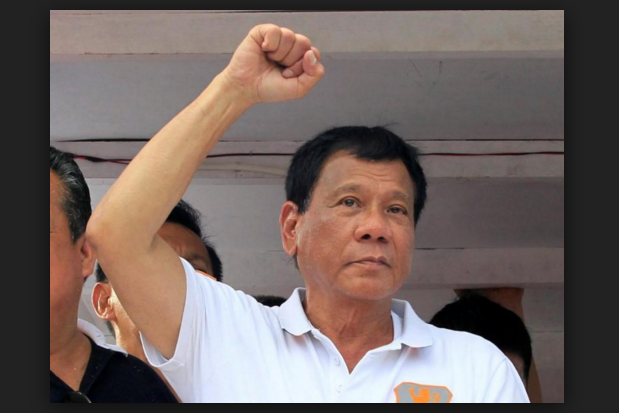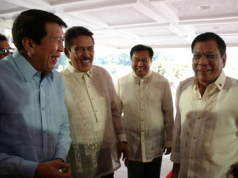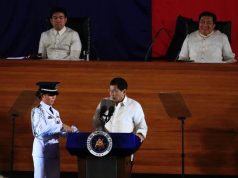MANILA, Philippines – The impeachment complaint against President Rodrigo Duterte, the first filed against him in less than a year in office, is dead.
The complaint, filed by Magdalo Partylist Rep. Gary Alejano was declared sufficient in form by the House Committee on Justice but all of the panel’s 42 members voted that it was not sufficient in substance.
Before the vote, members of the panel lengthily discussed what would happen to an impeachment complaint that was deemed insufficient in substance. The questions were: If insufficient in substance, is the complaint deemed dismissed? Or, as stated in the Rules on Impeachment, is it referred back to the complainant so that he could fix the deficiencies? If dismissed due to insufficiency in substance, can the committee accept a new complaint?
The committee then suspended the proceedings and went on an executive session to resolve the questions.
Upon resumption, Majority Leader Rodolfo Fariñas said the committee had voted to declare the complaint sufficient in form “out of liberality,” but added that in the next impeachment complaints, the complainants should have full personal knowledge of their allegations.
Albay Rep. Edcel Lagman, who is with Alejano in the independent minority bloc, said the determination of sufficiency in form should be merely procedural.
“Is there a verified complaint? Is it subscribed and sworn to, and I think this is answerable to the affirmative. We should not meander on the substance now, we should first determine the form,” Lagman said.
Quizzed on personal knowledge on allegations
Fariñas quizzed Alejano on his personal knowledge on the allegations cited in the complaint, such as the 8,000 killed in the drug war; 1,424 deaths in Davao when Duterte was city mayor, and the alleged billions of pesos that Duterte had in his bank accounts.
Alejano asked the panel to be allowed instead to read his opening statement, but was not permitted.
He said the allegations in his complaint were “culled from authentic records” and open sources such as the President’s policy statements, public records, and media pronouncements.
“What I stated here as personal knowledge is that of a complainant and endorser, not as witness,” Alejano said.
“Those are personal knowledge as I went through the documents, I have examined the things I have heard, personally, I have heard the policy on killings,” he added.
Fariñas said he wanted to know if Alejano had personal knowledge of his complaint to ensure that his allegations were true and correct.
“If the information are not of your own personal knowledge, then let the person be the complainant and then you endorse . . . this is to ensure that the allegations are true and correct, not hearsay,” he said.
“Kung magdadala kami sa Senado ng ebidensya na puro hearsay, eh di nagmukha kaming gago [If we will bring evidence to the Senate that are all hearsay, then we will look stupid]” Fariñas said.
Fariñas added, “In fact, delikado kayo sa [you could be in danger of] perjury because you stated in your verification that all allegations are true and of your personal knowledge.”
“Propaganda na ang nangyayari rito na ginawa na rin ni Senator (Antonio) Trillanes, ngayon ginagawa niyo rito [What’s happening here is propaganda just like what Sen. Trillanes did, which you now do here]” Fariñas told Alejano.
“I’m warning you, you may be subjected to ethics case here,” he added.
Alejano filed the main complaint on March 16. A supplemental complaint was filed on March 30.
The complaints were referred to the House justice panel on May 9, which according to its chair, Oriental Mindoro Rep. Reynaldo Umali, was the reckoning date for the one year ban rule on any impeachment comoplaint that may be filed against the President.
The Constitution says that one only impeachment complaint may be initiated against any impeachable official in one year.
Only three officials had been impeached since 1935: President Joseph Estrada, Ombudsman Merceditas Gutierrez, and Chief Justice Renato Corona.
Corona’s impeachment resulted in a conviction by the impeachment court in 2011.
‘Requirement of substance met with recital of facts’
Umali, in an opening statement, said the complaint was filed “in a crucial period” when Congress is faced with the task of addressing legislative measures necessary to help the Duterte administration.
Lagman appealed to the House committee to allow Alejano to be heard.
Lagman said that under the House Rules of Procedure in Impeachment Proceedings, the “requirement of substance is met if there is a recital of facts constituting the offense charged and determinative of the jurisdiction of the committee.”
“While it is true that an impeachment proceeding is a political exercise, it is not a partisan enterprise. A political process entails an exercise of values, advocacies and judiciousness. Partisanship is the direct opposite. It is the blind adherence to the dictates of a party or an aggrupation. It is an injudicious allegiance to a figure or a group,” he said.
“Representative Gary Alejano deserves to be heard and the Committee on Justice, as well as the Filipino public, are entitled to hear the Complainant in the instant impeachment proceeding,” Lagman added.
A brief debate ensued after Kabayan partylist Rep. Harry Roque, citing the practices of the past Congresses, pushed for the removal of the supplemental complaint from the main complaint. Umali said only the current rule as approved by the 17th Congress would be applied.
Specific allegations vs Duterte
Alejano, a former military officer, said the impeachment complaint was based on Duterte’s alleged culpable violation of the Constitution, bribery, betrayal of public trust, graft and corruption, and other high crimes.
He said all these actions constitute proper grounds for his impeachment pursuant to Sections 2 and 3, Article XI of the 1987Constitution.
The specific crimes mentioned in the complaint are:
a. Duterte committed high crimes of bribery, multiple murder, and crimes against humanity when he adopted a state policy of inducing policemen, other law enforcement authorities, and vigilante groups into the extra-judicial killings of more than 8,000 persons who were merely suspected of being drug offenders;
b. His involvement in multiple murder as mastermind of the Davao Death Squad;
c. He committed graft and corruption with the hiring of 11,000 ghost employees when he was still a mayor of Davao City; and
d. His unexplained wealth amounting to more than Two Billion Pesos in deposits and credits that flowed into his numerous bank accounts.
The supplemental complaint alleges that the President took a “defeatist stand” on China’s aggressive motion within the West Philippine Sea, the place the Asian large has constructed synthetic islands on which it has arrange fortifications and navy services.
Two other complaints, this time against Vice President Leni Robredo, are with the office of Speaker Pantaleon Alvarez, but do not have an endorser yet.
The Volunteers Against Crime and Corruption is also poised to file an impeachment complaint against Ombudsman Conchita Carpio-Morales.









